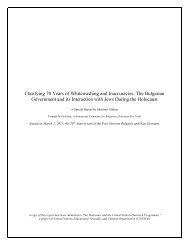Fortune Telling and Palm Reading are Not Part of Judaism - Alfassa
Fortune Telling and Palm Reading are Not Part of Judaism - Alfassa
Fortune Telling and Palm Reading are Not Part of Judaism - Alfassa
You also want an ePaper? Increase the reach of your titles
YUMPU automatically turns print PDFs into web optimized ePapers that Google loves.
Contrary to what is <strong>of</strong>ten taught by the mainstream<br />
kiruv (outreach) organizations, <strong>Judaism</strong> is truly a<br />
religion that allows you to question concepts, <strong>and</strong><br />
most importantly, is a religion based upon existing<br />
as a person <strong>of</strong> the world <strong>and</strong> a person <strong>of</strong> the Torah.<br />
This type <strong>of</strong> <strong>Judaism</strong> was the basis for Jews such as<br />
the Rambam (Maimonides). The Rambam, talks<br />
about the practices <strong>of</strong> fortunetellers <strong>and</strong> others like<br />
them, he considers these acts to be idolatry. 14 The<br />
Rambam says,<br />
It is forbidden to practice divination or to<br />
consult a diviner. One who consults a<br />
diviner is flogged because <strong>of</strong> a Rabbinical<br />
decree, but the diviner himself is liable to<br />
flogging [according to the Torah], for it is<br />
written, ‘There must not be found amongst<br />
you...anyone who uses divination.’” 15<br />
He indicates that divination consists <strong>of</strong> performing<br />
particular actions, “In order to elevate oneself <strong>and</strong><br />
clear one’s mind <strong>of</strong> all [thoughts <strong>and</strong>] matters until<br />
one starts predicting the future by saying, ‘Such-<strong>and</strong>such<br />
will, or will not, happen, or, ‘It is fitting to do<br />
such-<strong>and</strong>-such, but because <strong>of</strong> such-<strong>and</strong>-such a<br />
reason’” 16 The Rambam points out however, that<br />
there is no problem making a statement such as,<br />
“This house that I built is a good sign for me,” or,<br />
“This woman that I married is blessed, for once I<br />
obtained her I became rich.” These statements <strong>are</strong><br />
permitted because by making them no one has<br />
decided upon a course <strong>of</strong> action or refrained from<br />
doing something, one has just accepted whatever it<br />
is as a good sign for what has all ready happened.<br />
It is clear. The Torah says, “You should be<br />
wholehearted with Hashem your God. For these<br />
nations which you inherit, they listen to<br />
14 Yad Hahazakah, Hilhot Avoda Zarah, Chapter 11<br />
15 Hilhot Avoda Zarah, Chapter 11, 7<br />
16 Hilhot Avoda Zarah, Chapter 11, 6<br />
P a g e | 4<br />
fortunetellers <strong>and</strong> diviners; but as for you, [the Jews]<br />
not so has Hashem your God given.” 17 Rabbi David<br />
Bassous 18 quotes Rabbi Nahman <strong>of</strong> Barcelona, the<br />
Ramban, when he says that, “You should be<br />
wholehearted with Hashem,” means that we <strong>are</strong> to<br />
direct our hearts to Him only, <strong>and</strong> believe that He<br />
alone does everything. Rabbi Bassous continues:<br />
We <strong>are</strong> not to inquire <strong>of</strong> the astrologers or from<br />
anyone else, or by any means to trust that their<br />
words will be fulfilled. Instead, if we hear any<br />
prediction [<strong>of</strong> the diviners] we should say,<br />
‘Everything is in the h<strong>and</strong>s <strong>of</strong> Heaven, for He is<br />
the God <strong>of</strong> gods Who is supreme above all, the<br />
Omnipotent One over everything, Who changes<br />
the set order <strong>of</strong> the stars <strong>and</strong> constellations at His<br />
Will, Who frustrates the tokens <strong>of</strong> the impostors,<br />
<strong>and</strong> makes diviners mad.’<br />
Rabbi Elazar Menachem Man Shach, the former<br />
Rosh Yeshiva <strong>of</strong> the (Litvish) Ponevezh Yeshiva in<br />
B’nei Brak, Israel, once said, “It is absolutely<br />
forbidden to read palms or to believe what is seen in<br />
them. The Torah states, ‘You shall be perfectly<br />
faithful to Hashem your God.’ We must rely only on<br />
God. All else is nonsense.” 19 Well known author<br />
Rabbi Hillel Goldberg Ph.D., also points out that we<br />
must only rely on God. He says palm reading is the<br />
opposite <strong>of</strong> being “wholehearted with God.” He<br />
indicates:<br />
There is a thin but very real line between<br />
idolatry <strong>and</strong> wholeheartedness. To be<br />
wholehearted with God does not mean that<br />
17 Deuteronomy, 18:13, 14<br />
18 Rabbi Bassous attended college in Engl<strong>and</strong> <strong>and</strong> after receiving<br />
an Engineering degree, attended various yeshivot in Engl<strong>and</strong><br />
<strong>and</strong> Israel. He received his semiha (ordination) from the<br />
Shehebar Sephardic Center (Midrash Sephardi) in Jerusalem as<br />
well as that <strong>of</strong> the Israel Chief Rabbinate. He is rabbi <strong>of</strong> the<br />
Sephardic Congregation Etz Ahaim <strong>of</strong> Highl<strong>and</strong> Park, NJ.<br />
19 Rabbi Shach (1898-2001). Qtd. from “<strong>Palm</strong> <strong>Reading</strong>” by<br />
Rabbi Yirmiyahu Ullman, May 24, 2003. The Ponevezh<br />
Yeshiva is considered the Harvard <strong>of</strong> h<strong>are</strong>di yeshivot.<br />
_____________________________________________________<br />
Academic Paper Series - Paper No. 4.<br />
Authored by Shelomo <strong>Alfassa</strong> – Issued January 5, 2008



